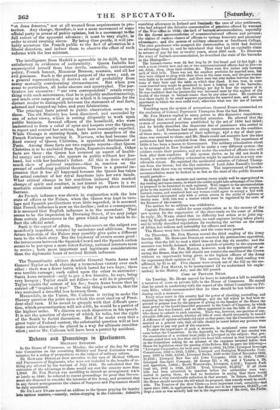The intelligence from Madrid is agreeable in its drift, but
un- satisfactory in evidences of authenticity. Queen Isabella has
emancipated herself from blue devils, camarilla, anti-national policy, French bonnet, Monsieur Bresson, mamma, and all her evil geniuses. Such is the general purport of the news ; and, as a general representation, it derives an air of probability from many mutually corroborating circumstances. But when you come to particulars, all looks obscure and apocryphal. The par- ticulars are excessive : "our own correspondent" retails every- thing with such minuteness, that he is palpably undiscriminating, and sends over cargoes of gossip in which it is impossible for the distant reader to distinguish between the statement of real facts, adorned and vamped-up tales, and pure fabrications. The principal facts patent to public observation seem to be these. The old Ministry has been dismissed, and succeeded by one of sober views, which is setting diligently to work upon public business. Several officers of the household, who were understood to form a cabal of spies and keepers over the Queen, to report and control her actions, have been summarily expelled. While Olozaga is entering Spain, late active members of the French Embassy are leaving it. Narvaez, who had become the fixed enemy of Queen Christina, is appointed Ambassador at Paris. Among these facts are two cognate reports—that Queen Christina is to be excluded from Spain, Espartero recalled. Other facts are these : the Queen has assumed an aspect of health- ful energy and spirits; she appears in public without her hus- band, but with her husband's father. All this is done without much show of political reaction--that is, reaction on the ground of conflicting political theories. There is a general im- pression that it has -all happened because the Queen has taken the actual conduct of her royal functions into her own hands. What critical change in her condition induced this marked change of spirit and conduct, is not hinted at. There is a re- markable scantiness and obscurity in the reports about General Serrano.
As French influence was shown in conjunction with the late state of affairs at the Palace, when the Queen was kept in tute- lage and Spanish predilections were little regarded, it is assumed that French influence is now on the decline ; and as a consequence, it is assumed that English influence is in the ascendant. That seems to be the impression in Downing Street, if we may judge from certain pheanomena in the press which may be taken to re- flect the official mind.
Such is the aspect of affairs. The statements on the subject are manifestly imperfect, vitiated by omissions and additions. Some future historian of the Palace may possibly give quite a different turn to the whole story. But the tendency of events seems good : the intercourse between the Spanish Crown and the Spanish nation seems to be put upon a more direct footing, national interests seem to revive ; both more important and legitimate considerations than the diplomatic boast of revived British influence.


























 Previous page
Previous page